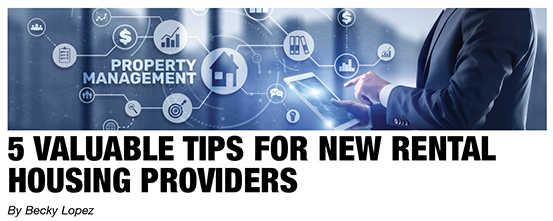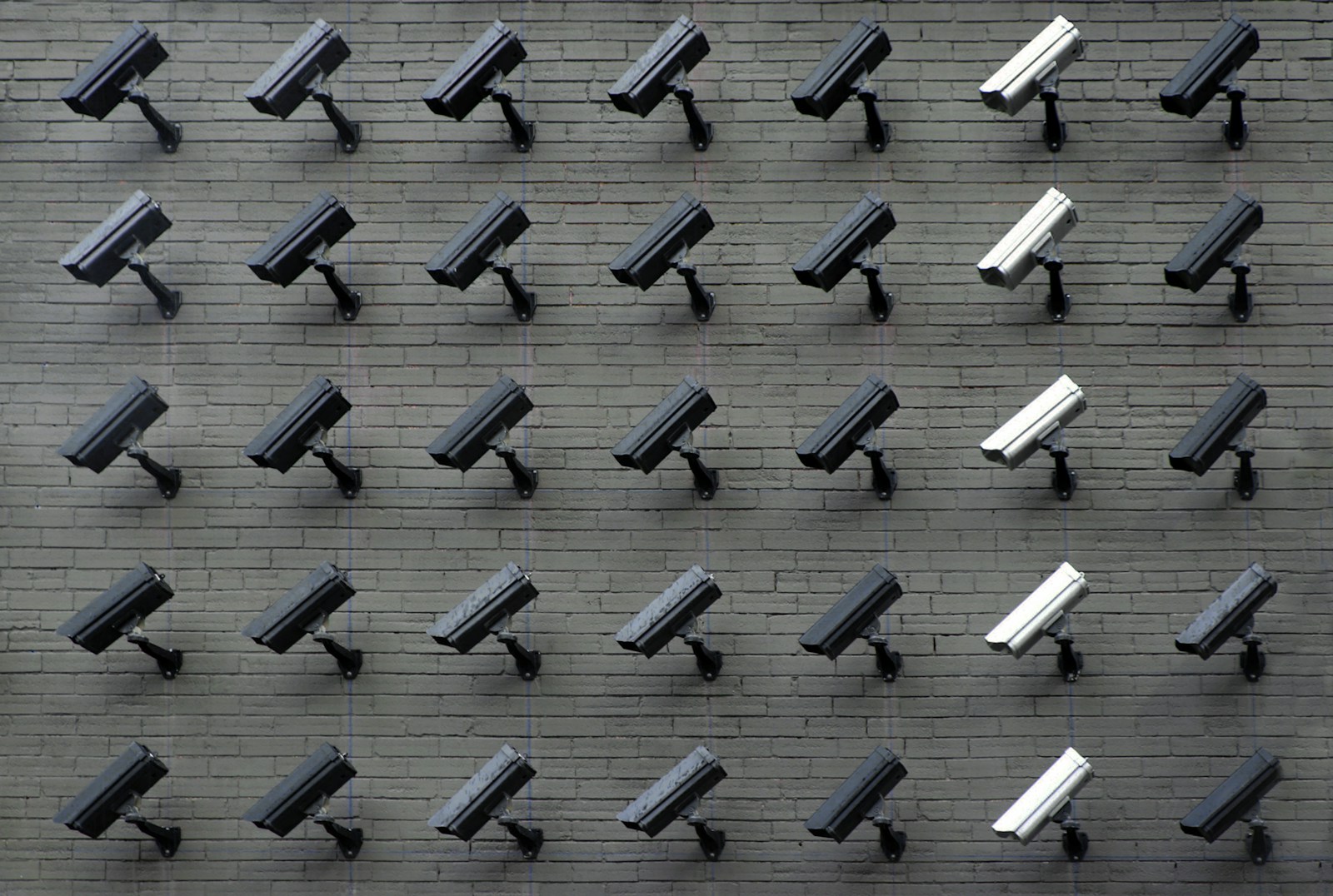5 Valuable Tips for New Rental Housing Providers

By Becky Lopez
Most new housing providers may think that once they’ve had a tenant living in their apartment or real estate property, their dream has come true, and all they have to do is to sit back and collect the rent. Often, this dream may turn into a nightmare sooner than you expect. Problems such as delayed payments and tenant issues such as lost keys and broken pipes may become the order of the day. If you’re a new property owner, some valuable tips can make the whole experience less troublesome and more enjoyable. Keep reading.
- Your Rental Property Is A Business
Although managing your new rental property may not be your main job, it’s a business that provides extra income. Therefore, you need to treat it like a business by being professional with tenants and your property manager. You must comply with local, state, or federal laws for legality and reputation purposes. Do comprehensive research and consult a legal expert if some things are unclear. It’d be best to involve a local expert because they are well conversant with the local laws.
Further, like any other income, tax on rental income is mandatory, and you can refer to Internal Revenue service regulations to know the different taxes you need to pay. However, you may reduce your tax obligations by claiming deductions for upkeep and repairs, maintenance, depreciation, and expenses to improve the property. Here the input of a qualified tax expert or accountant is a worthwhile consideration.
In addition, you need to consider protecting yourself from risks or liability claims by taking out property and umbrella insurance. Typically, these types of insurance offer protections for loss of rental income, liability claims, and property damage. Therefore, you could get financial compensation for losses due to bad weather, break-in, or fire. Insurance coverage may also include dwelling coverage, which protects against the risks of renting out your apartment, condo, or rental property for long periods.
Having a business means operating at low costs to maximize your income. One way to check on cost is to pay low insurance premiums. To do this, you can compare different rates offered by providers and choose a favorable option. Just like you’d shop around for homeowners insurance you can do the same for a landlord policy by looking at the products offered by the carriers. Other ways to minimize rental property costs include; staying on top of maintenance, screening your tenants carefully, and maintaining good, professional relationships with tenant.
- Ensure You Get Only The Best Tenants
If you haven’t hired a property manager yet, you shouldn’t relax your tenant screening criteria to simply fill a vacant property. A bad tenant can lead to higher operating costs and reduced rental income, affecting your property’s return on investment. Always be thorough in the screening process by reviewing all applications and filtering your ideal tenant by using the following information;
- Contact information, including name, telephone number, and Social Security Number
- At least two prior addresses of where they last lived
- Employment history and compensation history
- References such as previous landlords, creditors etc.
- Proof of income such as bank statements, payroll stubs and tax returns
- Credit and criminal background reports
Contacting the referees and the previous landlord may take a few minutes or hours but could save you the possibility of letting a bad tenant live at your property. You can use various online tools such as Truthfinder or Instant Checkmate to run a quick background on an individual. A little check on their social media profiles, such as Facebook or Instagram, can also give you an insight into the character of the type of person who wants to rent your property.
- Hire A Property Manager
Hiring a professional property manager can save you a lot of money in the long run. Whereas you’ll pay a management fee monthly, the financial benefits of someone managing your rental property are enormous. A property manager is not just your right-hand person but also handles the following activities:
- Marketing your rental property online and offline
- Screening tenants
- Conducting routine checks on the property
- Collecting rent
- Ensuring tenant satisfaction
- Handling repairs and maintenance requests from tenants
- Legal help and managing evictions
- Deals with documentation and taxation issues.
A property manager may enable you to build a steady rental income while minimizing the burden of handling daily operations. Before you hire a property manager, it’s essential to do a background check and ensure they have licenses to enforce local, state, and federal laws concerning screening tenants, lease termination, handling deposits, and evictions.
- Be Clear On House Maintenance Rules and Maintain Good Service
It is essential to know your rights as a landlord if a tenant damages your property willingly or unwillingly. Typically, it’s every property owner’s worst nightmare if you have to bear all the repair costs. These structural damages can cost you a lot, from tearing up your carpet, smashing windows and doors, and ripping out pricey appliances to punching holes in your wall.
Be clear on your expectations when signing the lease agreement with your tenant. Ensure there are clauses in the tenancy agreements on who should bear maintenance costs. You can even do an in-person meeting before they get in so that they can be aware of their role in keeping the property in good condition. One common mistake new landlords make is to lease their properties and not perform regular inspections. It’s essential to set foot on your property at least twice a year to have peace of mind that your property is still in good shape.
Ask the tenants if they’re comfortable and if they need improvements or upgrades. Good tenants are likely to stay longer if they feel that you genuinely care about their stay on your property.
- Simplify The Rent Collection Process
Unlike early in the days when tenants would deposit their rent in a landlord’s account with cash or check, you can simplify the rent payment process by using online payment services. There are many payment solutions that you can utilize to eliminate late fees. Also, such systems can make it easy to collect penalties for defaulters.
Only some collections processes may be right, and what works for one landlord may only work for some. When choosing an ideal process, get a more streamlined and efficient system. If you live far from your property, consider hiring a third party for rent collection or ask your tenants to do electronic transfers. Some people still prefer collecting rent by mail. No problem with that, but ask your tenants to provide a certificate of mailing from their post office as proof that mail was sent. You can use this to track delayed mail.
If you live near the premises, you may ask your tenants to drop off their checks at your workplace or home address. Be careful and refrain from receiving wads of cash, as several risks are involved. If you have the time, consider collecting rent in person. But be sure to ensure you issue your tenant a receipt after receiving the check.
Final Thoughts
Being a first-time landlord may seem easy, so long as everything runs as it should. However, it’s a tough call, so it’s crucial to consult experts such as your local apartment association, attorneys, appraisers, real estate agents, accountants, and property managers to help you along the way. With these valuable tips, you’ll enjoy hassle-free relationships with your tenants and better returns on your investment.
The author, Becky Lopez, lives in Miami. She started freelance writing as her full-time job when the COVID pandemic closed her office. She lives with her younger brother, and their parrot, Sinbad. When she isn’t writing, she loves to read and chill, watching Netflix. She also enjoys travelling.






